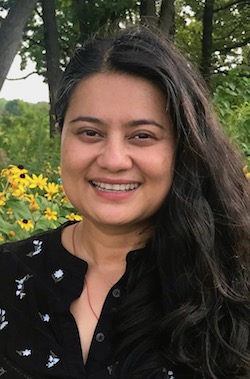 As the founder and director of the acclaimed Sacred Earth program at the World Wildlife Fund, Dekila Chungyalpa worked with faith leaders from all around the globe — in the Amazon, East Africa, the Himalayas and the Mekong region. For 5 years, she worked with four very different groups: Buddhists, Christians, Muslims and Indigenous Leaders on faith-based conservation efforts. It is through this work that Dekila identified a blindspot in the field of conservation, which mostly ignored the potential and power of engaging religions to address environmental problems. She went on to found the Loka (the Sanskrit word for one or many worlds) Initiative, a new interdisciplinary program at the University of Wisconsin-Madison dedicated to environmental protection, sustainable development, and global health issues. Its mission is to support faith-led environmental and climate efforts locally and around the world by helping build capacity of faith leaders and culture keepers of indigenous traditions. In 2020 alone, her work has ranged from training Buddhist monastic leaders on coronavirus-preparedness guidelines, to organizing public outreach programs on connecting inner, community, and planetary resilience, to creating partnerships among faith communities including Evangelical Christians on creation care and climate change.
As the founder and director of the acclaimed Sacred Earth program at the World Wildlife Fund, Dekila Chungyalpa worked with faith leaders from all around the globe — in the Amazon, East Africa, the Himalayas and the Mekong region. For 5 years, she worked with four very different groups: Buddhists, Christians, Muslims and Indigenous Leaders on faith-based conservation efforts. It is through this work that Dekila identified a blindspot in the field of conservation, which mostly ignored the potential and power of engaging religions to address environmental problems. She went on to found the Loka (the Sanskrit word for one or many worlds) Initiative, a new interdisciplinary program at the University of Wisconsin-Madison dedicated to environmental protection, sustainable development, and global health issues. Its mission is to support faith-led environmental and climate efforts locally and around the world by helping build capacity of faith leaders and culture keepers of indigenous traditions. In 2020 alone, her work has ranged from training Buddhist monastic leaders on coronavirus-preparedness guidelines, to organizing public outreach programs on connecting inner, community, and planetary resilience, to creating partnerships among faith communities including Evangelical Christians on creation care and climate change.
Born into a well-known Buddhist family from Sikkim, Dekila’s journey is fascinating. Her mother was the first Sikkimese nun to complete a three-year solitary retreat as per Tibetan Buddhist tradition. Dekila assisted His Holiness the Karmapa in creating and launching Khoryug, an eco-monastic association of Tibetan Buddhist monasteries and nunneries carrying out environmental projects in the Himalayas in 2008 and continues to serve as his environmental advisor today.


